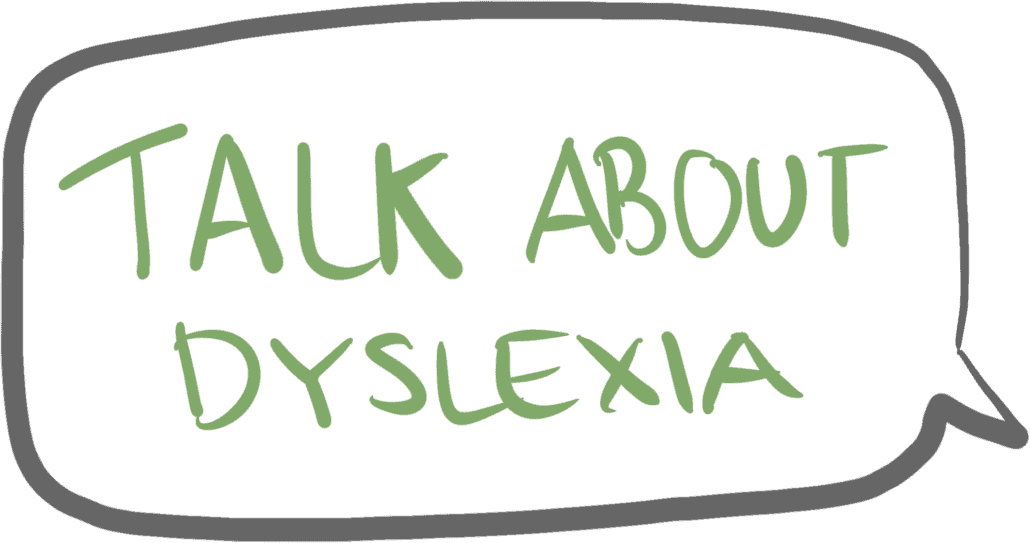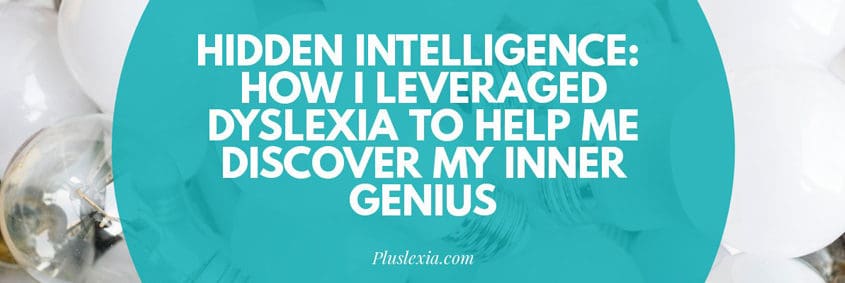Hidden Intelligence: How I leveraged dyslexia to help me discover my inner genius
Dyslexia is a neurobiological condition that is genetic. You can manage it but you cannot cure it, without altering your genes. A dyslexic’s mind is different from those who do not have this disorder and can* be viewed as a gift by those who have it.
A lot of people have this misconception that dyslexics see words backward, but this isn’t a condition that affects your eyes and sight, it is a condition that affects your mind and how it processes language, which can affect: reading comprehension, writing, mathematics, grammar, speaking, spelling, and socializing. However, scientists and psychologists are noticing there is a hidden genius within a dyslexic’s mind. But, without the proper guidance, support, and a tenacity to succeed, some may never know how to tap into it.
No one knew I had dyslexia
It didn’t occur to me that I had dyslexia until I started working for myself in 2013. My mother revealed to me that she had the learning impairment, and when I looked it up and saw what the symptoms were I immediately related to her experience. My mom didn’t finish high school, so she wasn’t that much help in guiding me with my education. I had many troubles following along in school, which lead me to isolation and feeling like I would never accomplish anything.
My learning disability affected me in every part of my life. I was potty trained later than most kids, and didn’t really speak full sentences until the age of 4. Reading was challenging for as I would not see or understand sight words.
Even now, when I read I tend to miss words or miss sentences all together, which makes comprehension hard. My writing and grammar has always been atrocious. My handwriting and printing is non-existent to the extent that I dread filling out forms by hand. I always have issues speaking and fully articulating with what is in my mind. Reading and writing can take forever especially with topics that I do not understand.
I wasn’t aware of my condition; therefore, the teachers couldn’t give me the appropriate aid to succeed in school all up to high school. I didn’t graduate high school due to the lack of support. I always felt I was left behind, so I felt I needed to fend for myself and work through my impairment after I left Grade 12. I will add that if knew all that I know now, I would have challenged myself in school, I would have asked for accommodations and I would have gone off to become a lawyer.
My biggest challenges with Dyslexia now are reading, writing, and speech. I often feel trapped in my mind, as I know more than I can articulate. Writing this article was very challenging, as it has taken me 2 weeks to write it. But, a mentor said to me a long time ago that practice makes perfect, thus I made a commitment to write to you all today about my disorder and how I leverage it to tap into my inner genius.
Intelligence Fallacy
have dyslexia and so does other members in my family, including my 9-year-old son who struggles with a form of it called dyscalculia. Growing up I had my challenges with it, but over the years I have learned how to leverage my disorder. People often ask me why I give myself this label? Well, if I don’t label myself a dyslexic then I give everyone else the opportunity to judge my speaking, writing and grammar skills.
After all, the value is placed on those who have education, and those skills show a person what your self-worth is. But, what I and many others have proven is that reading, speaking, it and writing don’t determine a person’s self-worth, nor does it indicate intelligence and the ability or inability to reason.
What most people don’t realize is that dyslexics are not only creative but in a lot of cases, they are intelligent too. There are a lot of famous entrepreneurs and celebrities that are dyslexic, but the most notable ones are Albert Einstein, Erin Brockovich, Stephen Hawking, Steve Jobs, J.K. Rowling, Leonardo Da Vinci, and Thomas Edison. There are a lot of cases of people being successful despite their condition working as entrepreneurs, scientists, actors and actresses, artists, and architects.
Confidence
Along with my journey, I had the pleasure in meeting a few mentors that I met indirectly through my father. Some were business people, martial artists, and financial advisors. As a young lad, they all saw something in me that I didn’t see in myself.
They told me I would do great things, and that helped me build my confidence. They were able to fill in gaps that my parents couldn’t fill. When you’re confident in yourself, despite any learning impairment, you find alternate ways including finding tools that can help you learn.

Accommodations and tools
I used to sell cellphones in my early 20’s and I had to memorize brochures about cell phones and cell phone plans. I was only making minimum wage but could get paid commission if I sold a lot of phones. The incentive was enough for me to go home and stay up all night learning all of the plans. This process was so hard for me, but I learned how to create concept & mind maps and started organizing the training material in a different way.
The tools helped me remove sight words like ‘the’, ‘of’, etc. I treat words and phrases like objects which helped me understand the context better, especially because these methods help me remove redundancies and information that weren’t important.
I also used (and still use) a program called “ReadPlease 2003” that reads any text out loud and also allows your eyes to follow along. I also have the ability to change the speed of the narrator so that I can cut through a lot of reading within a small frame of time, rather than take days to read one page. Speed reading during this process allows you to pick up key aspects of the material without focusing on sight words.
I also use Trello to organize information in a visual way that I can read at a glance. A Trello board is a list of lists, filled with cards that you can move and interact with, and since most dyslexics are visual-spatial learners, Trello helps me see information in a way that is easier for me to understand.
Sleep and sacrifice
In my career working for other people and working for myself sometimes I had to get things in by certain deadlines. Sometimes I had to sacrifice sleep in order for me to ensure that I completed my work. To a lot of people, I made dyslexia look very easy when it has always been a struggle for me. It is a sacrifice of time that you have to put in regardless of how severe your learning disability is that gives you an advantage in your working life.
First principles
My friend, an author of the book Predictive Innovation, Mark Profitt says that: you only need a small amount of information, organized the right way in order to see the answer. He uses an example of a ‘pixeled’ image, where all you need is enough pixels in an image to recognize what the picture is about. Our eyes can recognize shapes even if an image is distorted.
Dyslexics thrive when information either written or spoken is clear and can be boiled down into first principles. English is very complex and has the most words compared to all of the languages. French and English seem to be the most challenging languages for dyslexics, thus simplifying and chunking information down into their first principles, help dyslexics process the information quicker.
The power of incomprehension
Later in my 30’s when I discovered dyslexia, I realized that all this time I had visual-spatial intelligence and that I have a 3D simulator in my brain that views everything as objects which allows me to manipulate, add and remove, change positions, rotate axis etc.
I later realized that I could reason by comparing objects in my mind. Apart from my gift, I can hear and compose music, by disassembling and reassembling music that I come across. The power of simulation is that if you don’t have the basic building blocks of any subject then a picture can’t be formed.
This begs the question: is the information I am reading correct and is it presented in the right way? We often appear to authority, believing that just because information is presented in a textbook or by an expert that it must be right when sometimes people can get things wrong.
When I cannot simulate an image I then look for other sources either digging for more clarity or debunking what I am hearing or reading. Dyslexics are known to challenge the status quo, and because we are forced to re-examine things that we cannot comprehend we often make discoveries that others don’t.

The power of forgetfulness
I have a bad short-term memory which is quite common among dyslexics, but this is by design because my brain uses its processing power for mental simulation. I am constantly creating new things in my mind, whether it’s a new song, a design for a client, or solving issues for myself.
Professor Blake Richards, of Toronto University, said: “It’s important that the brain forgets irrelevant details and instead focuses on the stuff that’s going to help make decisions in the real world… If you’re trying to navigate the world and your brain is constantly bringing up multiple conflicting memories, that makes it harder for you to make an informed decision.”
Einstein also said that he doesn’t memorize things that he can look up. Einstein being a dyslexic himself knows the power of brain processing power and setting up stable systems to store information. Memorization doesn’t help with creative thinking, nor does it give you space to discover new things. I used tools like Evernote, Trello, Mind maps for information storage and use my mind for creativity.
Surrounding myself with smart people
In extension to storing information instead of memorizing, I always leveraged the smarts of other people. 2 heads are always better than 1, and when you’re around people smarter than yourself, you don’t have to use so much energy trying to learn on your own. In my case, I have always kept mentors in my life because mentors are a cheaper than free resource because for them they want to help me learn, and they will take as much time with me until I understand.
3 “P”s and 3 “R”s
Practice, Practice, Practice and Repetition, Repetition, Repetition. I learned about 3 “P”s and 3 “R”s nearly 15 years ago when I was in martial arts. My sensei would say that the 3 “P”s and 3 “R”s were the only way that a person could reach perfection. He also mentioned that the pursuit to perfection will last your whole life. There have always been cases with my disorder where I just couldn’t get what I was learning. And, when accommodations fail to work, the 3 “P”s and 3 “R”s would prevail.
The art of practicing every day on anything you want to master, works for all people. Every day you practice, you learn something new about what you’re trying to master, and you also learn about yourself. Through this method, I have conquered a lot in a short time span.
I practice reading and writing every day. It is practice that allowed me to learn how to read university-level journals and post-secondary textbooks about marketing, branding and etc. I taught myself graphic design, motion graphics, video editing, music production, and web development. And, I have been able to put my knowledge into use and make a living out of it. I learned this all without formal training or going to post-secondary school.
Final thoughts
Dyslexia will be with me until the day that I die, and instead of treating it like a disorder I have leveraged it to allow me to become the entrepreneur that I am today. It was unfortunate for me that I did not get the support that I needed throughout my schooling, but besides the odds, I still prevailed because I believed that I could succeed. As a result, I’ve accomplished many things and created my own pathway to my own success. And as a father, I have passed down techniques that my son uses in his school and he happens to be one of the top kids in his class.
I felt that the school system and my parents failed me, and I wasn’t going to do the same to my son. When I found out his mom was *pregnant I would talk to him and play music for him in his mom’s womb. Studies have shown this to be helpful in developing a child’s brain. The day that he was born, I could remember him crying and when he heard my voice for the first time he immediately stopped.
Update: I am not saying that if you play music and talk to a pregnant woman’s belly will help prevent a learning disorder like dyslexia. I read that classical music can help develop a babies brain, and I wanted to do everything in my power to help my son get a good start in life.
Malcolm, was a very calm baby as a result because we continued on playing music for him and speaking with him even though he was an infant. Because I had problems with reading, I started introducing words to him when he was 12 months, and then he began reading at Age 2. One of the reasons why I became an entrepreneur is because I wanted to be at home so that I can support my son and give him a head start. As a result of me staying home, he has done really well in school, with teachers and principals saying that he is a model student.
Last year, Malcolm was having troubles with his math. What I realized with him is that he has a form of dyslexia called dyscalculia. He has a problem with calculations and recognizing numbers. The teachers and I started working with him and as a result, he loves math and has a better grasp of it. This is why is early detection of these learning disorders can really set a child up for success. It brings a tear to my eye that my son will never have the same problems that I did growing up.
I will never treat dyslexia as a disability
There are parents out there that live through their children. For me, I don’t believe in that. I always want to be an example for my son so I continue to challenge myself. Just recently, he was so amazed that I was able to get 4500 subscribers on YouTube. He thinks it’s cool that his dad has over 3 million views.
I tell him every day to put a hundred percent in whatever he does, and I do the same. I will never stop working towards my goals, and I will never treat dyslexia as a disability. One of my major goals in the next few years is that I want to be able to get my diploma and go off to law school to become a corporate lawyer. I don’t have the resources now, and when I do I will start that next chapter showing my son that it doesn’t matter where you are in life that you can still achieve your dreams.
My dear friend Michael D. Haines, who has cerebral palsy, says that he doesn’t like the word disability he would rather call it a challenge, because we all have challenges, and some are more pronounced than others. And, without our challenges, we will never know what we can accomplish.
Without dyslexia, I don’t know if I would have been as driven and creative as I am. My dyslexia gave me a crazy work ethic and has allowed me to be skilled in many art forms, that provide an income for me. With every challenge, there is an equal opportunity for all of us to find our inner genius.
Write by




Dyslexia + ADD + OCD + ADHD Creative Right Brain Creative + Intuition = Success story for Me
http://www.RobertTothSculptor.com
Feel Free to use this information as you see fit if it could help others
Thank you for any feedback
Robert